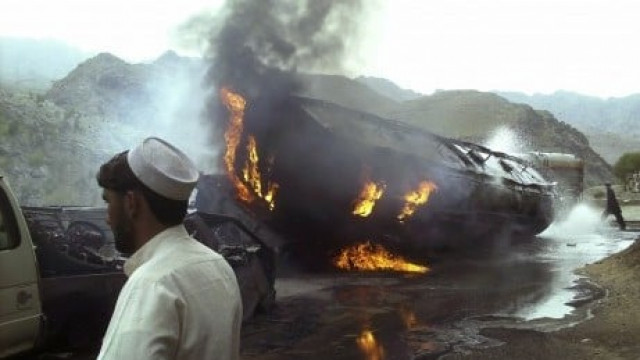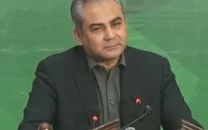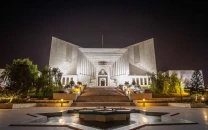Plan to raise FC-style force in Fata
The government is studying plans to raise a levies force to counter militancy, terrorism.

The new force will work under the command of political agents to counter militancy and terrorism in the tribal belt, Khyber-Pakhtunkhwa Governor Owais Ahmed Ghani disclosed in a comprehensive report. The governor in the 16-page report has made several recommendations to fight the twin scourges of militancy and terrorism. According to the report, the current wave of militancy in Fata has exposed many weaknesses and shortcomings in the political and administrative system being followed in Fata.
The governor notes that the present system of Khasadar (tribal community police) has become outdated. “With the passage of time and exposure of tribal citizens to education, trade and urban culture the tribal concept of ‘collective responsibility’ has considerably weakened.”
As a result, he maintained, the effectiveness of the collective responsibility and Khasadar system has been reduced to varying degrees in different tribal agencies.
Under the Frontier Crime Regulations (FCR) the ‘collective responsibility’ means the whole tribe collectively has to be punished for the offence of an individual of that tribe.
The report reads: “The phenomenal rise of highly-organised militant organisations not bound by tribal traditions and the inability of tribal chiefs (Maliks) and their tribes to counter those militant organisations has exposed the inadequacies of the Khasadar force system (which, in essence, is a community police) and forcefully brought home the need for a more effective and ‘tribally-neutral’ policing force under the direct command of the political agent for use over the entire agency and not limited to the area of any tribal sub-section.”
The report goes on to say that this will spare the newly upgraded Frontier Corps for border security duties and, if needed, for military operations in Fata.
According to the report, the Khasadar force will be capped and confined to the role of a community police for watch and ward duties and village defence functions.
The governor has recommended that the Frontier Constabulary should be placed under the command of the governor as it was before. He is of the view that FC is also useful for anti-terrorist and anti-robbery duties and controlling civil strife in the same manner as the Sindh and Punjab Rangers in their provinces.
The governor’s report says that the Frontier Corps has been upgraded from a paramilitary to regular military force equipped with tanks, medium artillery and gunship capabilities .The Frontier Corps will be employed to man the border with Afghanistan and for operations to counter militancy, the report added.
Converting Fata into a province is also recommended in the report. “Mainstreaming of Fata is being increasingly advocated with some suggesting the merger of Fata into Khyber-Pakhtunkhwa or converting it into a separate province,” the report says.
It adds, “The spillover of militancy from Afghanistan into Fata and Khyber-Pakhtunkhwa in the aftermath of 9/11 and invasion of Afghanistan by US forces and the consequent induction of the Pakistan Army into Fata delivered another body blow to the political administration when army authorities started direct dealing with militants and their tribal interlocutors and the political agents (civil administrators of tribal areas) were sidelined and lost influence and credibility.
“In the process the tribes and their Maliks whose effectiveness traditionally depended on state patronage, could not stand up to well-armed and better organised militants and, in the process, the state lost its most important instrument of administrative control and a potential counter-force to militancy.”
The governor’s report also contains a number of proposals for managing Fata politically. He is keen to establish Agency Development Councils for all the seven tribal agencies comprising tribal Maliks.
The governor alleges that Fata parliamentarians are unable to participate in development policies and programmes due to lack of capacity. The governor pleads that the tribal chiefs who have become ineffective after being replaced by elected MNAs and Senators should again be involved in the development of Fata.
It is obvious that tribal chiefs are unhappy after being replaced by Fata parliamentarians. “There is some resentment on this account,” the governor notes in the report. To appease those tribal chiefs the governor has recommended the establishment of Agency Development Councils. According to the governor, the proposed councils for tribal agencies will provide a forum involving both parliamentarians and tribal elders for participation in socio-economic development of their areas.
The governor does not feel comfortable with Fata parliamentarians for a variety of reasons. The governor, it may be recalled, had to face embarrassment after MNAs and Senators from Fata submitted resignations to press their demand for his removal.
The governor’s proposals to restore tribal Maliks system in Fata has drawn criticism from observers. “If implemented the measures suggested by the governor will take the Pakhtun tribes back to the Raj era,” remarked a former bureaucrat who has long served in the tribal areas.
The former bureaucrat, who wished not to be identified, said that the recommendations are meant to reorganise the administrative machinery of Fata but they would be counterproductive as far as the political aspect of the report was concerned.
K-P’s two major political parties, ANP and PPP, have long recommended steps to bring the tribes of Fata into the mainstream to counter terrorism and militancy.
President Asif Zardari, keeping in view those recommendations, had extended the scope of Political Parties Act, 1976, to Fata to encourage tribesman to participate in politics. Previously, taking part in politics was forbidden for tribesman under FCR, a throwback to the days of the Raj. If the report’s recommendations are implemented, they would militate against the federal government’s policy to bring the tribes into the mainstream of social and political structure.
Published in The Express Tribune, August 16th, 2010.



















COMMENTS
Comments are moderated and generally will be posted if they are on-topic and not abusive.
For more information, please see our Comments FAQ